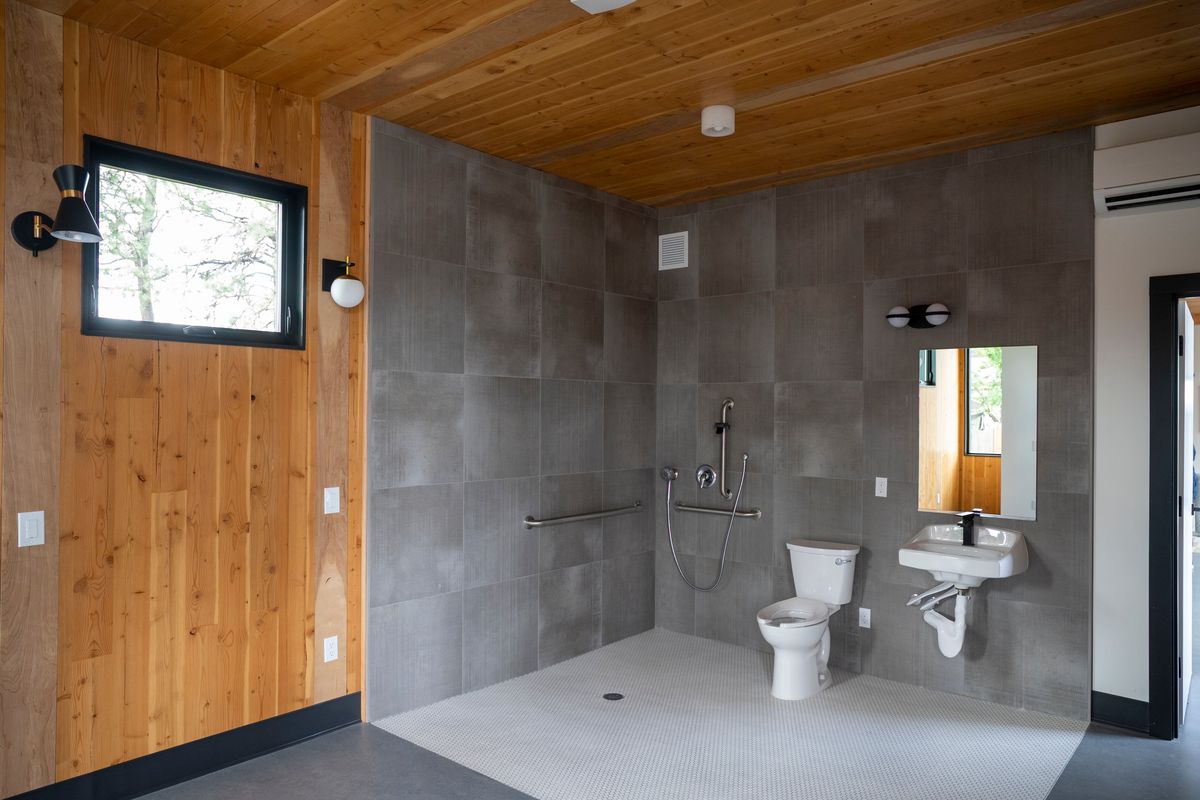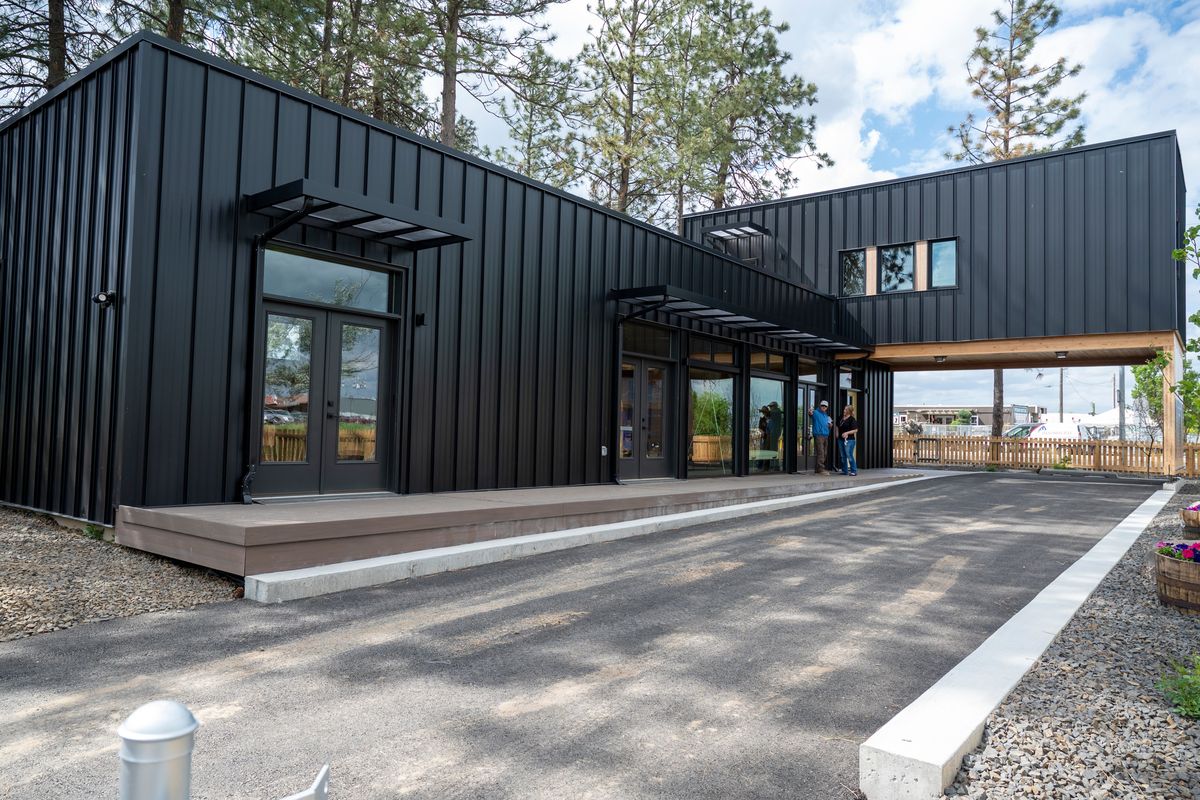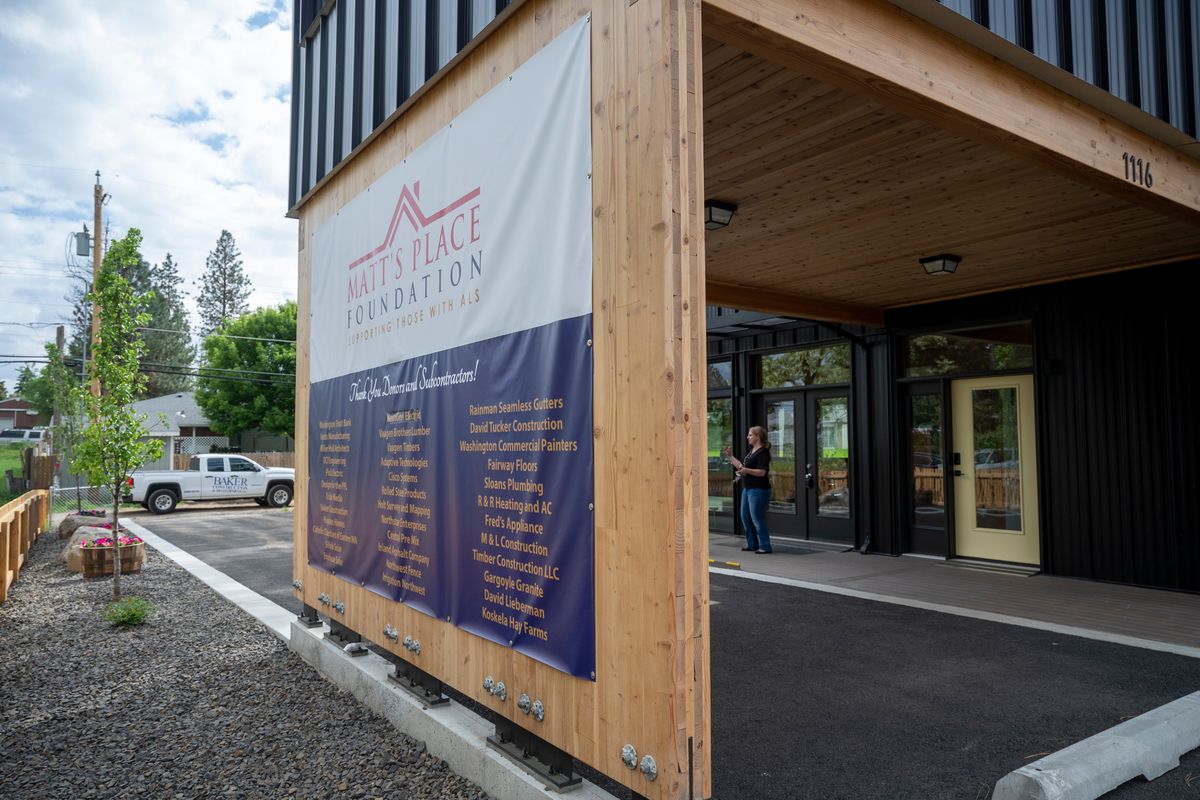Matt’s Place to open Spokane smart-house prototype designed for an ALS patient and family

A sleek modern home in north Spokane soon will offer residents the latest in adaptive technology. But its real design is to welcome a family dealing with amyotrophic lateral sclerosis, or ALS.
Matt’s Place Foundation is behind the three-bedroom residence. It will be the nonprofit’s second regional home after its 2017-built Coeur d’Alene house, where another ALS-impacted family lives rent-free.
The first Spokane occupants are expected this summer – also rent-free for as long as it’s needed – said Theresa Whitlock-Wild, who co-founded Matt’s Place with her husband Matt Wild. Now 50, he was diagnosed with ALS in 2015, the same year they started the foundation. They live in Coeur d’Alene.
The nonprofit’s smart homes are meant for mid- to late-stage ALS patients and their families to offset the financial burdens and daily overload they face, Whitlock-Wild said. A family leaves the home after the ALS patient dies or they have another place to move. Then, the home is available to another ALS patient and family.
“This house is very much a prototype, and we partnered with many people in the community,” Whitlock-Wild said.
The second home built by the Matt's Place Foundation features a sleek modern design and is in North Spokane, shown Monday, May 22, 2023. The home is designed for an ALS patient, the first of whom will move in within a few months and live there until they no longer need the house, then it will be shared with another patient and family. The home is built with cross-laminated timber framing. The interior is equipped to be controlled by a disabled resident using adaptive technology for lights, utilities and security. (Jesse Tinsley/THE SPOKESMAN-REVI)
“With this disease, it’s so expensive to navigate the durable medical equipment, the hospital visits, the medications – all of these things add up and families are sinking real fast. When they’re not paying a mortgage or rent, the caregiver could potentially have reprieve, not have to work full time.
“What’s very common is that the loved one works full time until their person with ALS is no longer able to be home alone. They have to quit their job, go through their savings.”
In Spokane, the nonprofit collaborated with regional designers and Baker Construction to build the house on a donated lot. It has cross-laminated timber framing, handicap access, energy efficiencies to lower utility costs and adaptive technology – so a resident who has ALS can control interior features, lights, utilities and security.
The latest prototype might be adapted as a scalable model with components shipped cross-country.
“But we’re not there yet,” Whitlock-Wild said.
The Spokane home has a large ground floor, open-design bedroom with a corner bathroom for the ALS member. The ground floor has a kitchen, living room, laundry and guest bathroom. Upstairs are bedrooms for family members.
ALS, or Lou Gehrig’s Disease, is a neurodegenerative condition that affects nerve cells in the brain and spinal cord. With progressive degeneration, the motor neurons slowly die, affecting the ability of the brain to initiate and control muscle movement. People may lose the ability to speak, eat, move and breathe. Muscles deteriorate.
Over time, ALS patients require home remodels to live independently. Although the average survival after diagnosis is two to five years, some people live 10 years or longer, the ALS Association says. Financial impact also includes the ALS patient’s loss of income.
Because her husband is a former U.S. Marine, Whitlock-Wild said they have received generous Veterans Affairs support for care and adaptive options over the years. But soon after his diagnosis, they knew many families didn’t have such resources and grappled with costs. An adaptive vehicle with wheelchair access can reach $100,000.
She said more than 130 families are affected by ALS in the Spokane-North Idaho region.
“It’s estimated that on average, families will spend $250,000 to $350,000 a year navigating this disease.”
In Idaho, Washington and Montana, the nonprofit gives grants toward residential ramps, bathroom remodels and accessibility upgrades – often collaborating with other agencies to cover full costs. Matt’s Place also provides mortgage and rent assistance. The couple always had a vision for smart homes, though.
The Coeur d’Alene home required fundraisers and more than 100 contractors volunteering time to build a house in a gated community that has full automation features. Both smart homes’ designs allow for the ALS member to use voice, eye gaze or tablets to control doors, lights, television, thermostat and blinds.
“The idea is it gives them independence even though they are living with this disease that has taken away a lot of that,” Whitlock-Wild said. “If the patient can’t talk, walk, move – they can still control their environment. The other consideration is the amount of burden that goes onto the caregiver.”
Whitlock-Wild also works as project manager for the Adaptive Technology Center at Washington State University Steve Gleason Institute for Neurosciences in Spokane.
It’s an information hub and a hands-on technological testing ground for adaptive devices to help patients with neurodegenerative diseases and their families.
But she said technology doesn’t have to be overwhelming. With a bluetooth switch, voice assistants like Alexa and a smartphone, she said, “We can wire up just about anything.”
Former Newman Lake residents Scott and Eileen Weyrauch live in the Matt’s Place Coeur d’Alene house, where they moved about three years ago. Scott Weyrauch was diagnosed with ALS in 2018, and staying at their lake place proved too costly. He formerly had good income as a specialized floor contractor.
“You pretty much lose everything, depending on your situation before ALS,” said Eileen Weyrauch, who trades off with an adult son as full-time caregivers for her husband. Selling their home paid off debt, with a little left over for a handicap-accessible van.
“Moving to the Matt’s Place home afforded us the ability to not have a mortgage, because all we have is my husband’s disability,” she said. “Now, whatever else comes up is centered around my husband’s care. I don’t know how people do it who still have a mortgage.”
Her husband has a trachea opening surgically created to allow air to fill the lungs, a ventilator and feeding tube.
Until a couple of months ago, he could walk independently. Now, she said two lifts in the house will help her move him, such as from a chair.
“What Matt’s Place does for families is unheard of,” Weyrauch said. “I’ll never be able to pay them back, but I will spend the rest of my life paying it forward being an advocate for families who have ALS and for Matt’s Place.”
Matt’s Place recently got a $100,000 grant to create a video series with best practices for home remodels for people living with the disease. The videos will be on the Matt’s Place website and distributed to clinics and support groups. Topics include accessibility modifications, assistive technology and home care services.
To stay in one of the nonprofit’s smart homes, people submit an application to Matt’s Place, but a separate admissions committee selects the candidates, Whitlock-Wild said.
“It’s really who has the greatest need, and we want to keep families together.”






